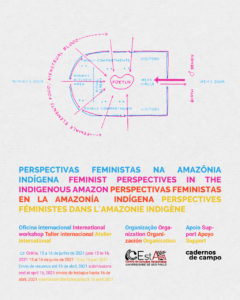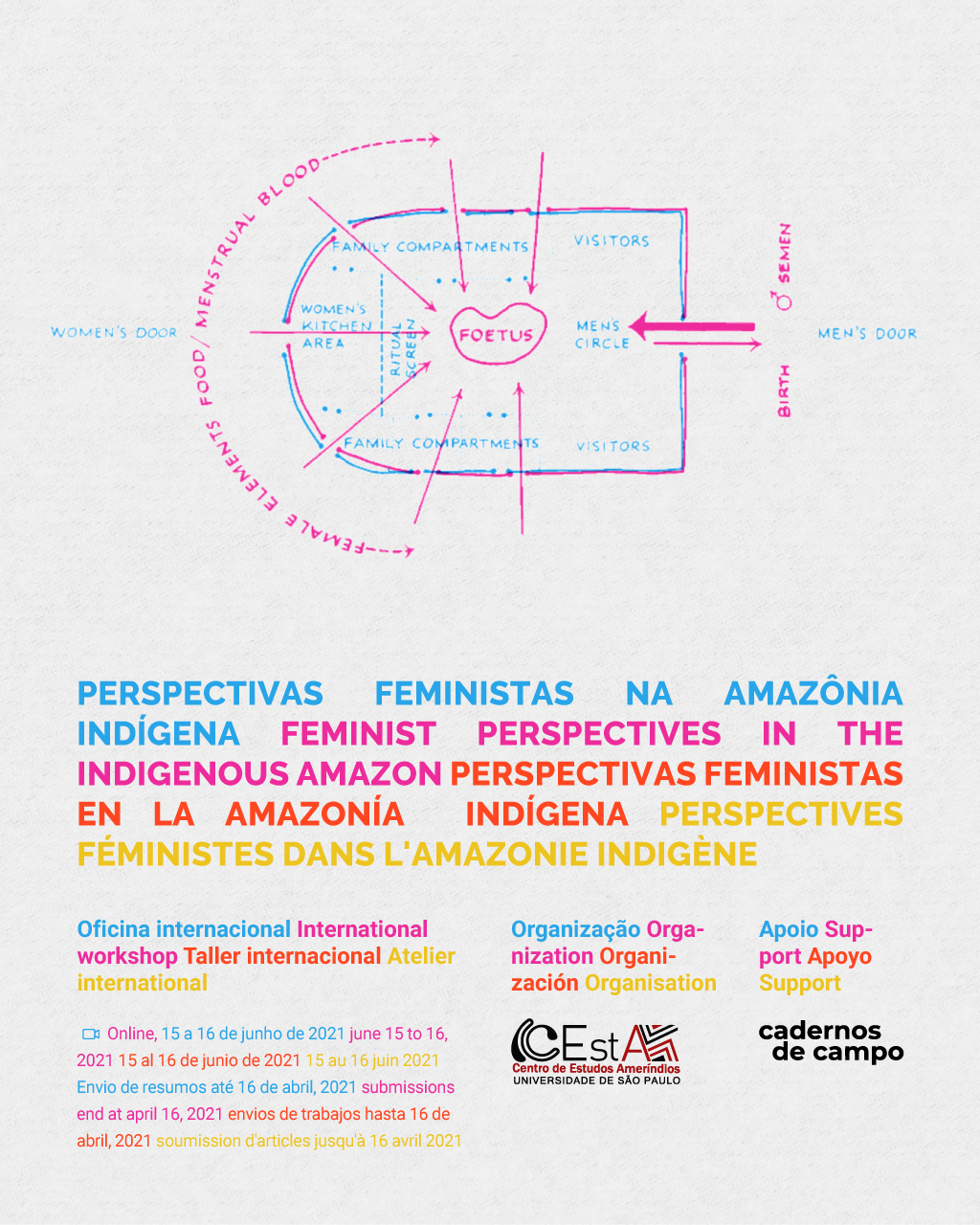Feminist perspectives in the Indigenous Amazon, International Workshop 15 and 16 June 2021

Feminist perspectives in the Indigenous Amazon
15 and 16 June 2021
Online International Workshop, Centro de Estudos Ameríndios (CESTA-USP) organized by Chloe Nahum-Claudel ([email protected]), Aline Regitano ([email protected]) and Marta Amoroso ([email protected])
Gender has long been neglected in the Amazonian literature, peripheral in ethnographies and often addressed by male ethnographers either as an economic issue of sexual division of labor, or in the Structuralist key: nature (woman) / culture (man). The analytical neglect of gender has sometimes been justified by essentializing ontological arguments that gender is an epiphenomenon of more encompassing divisions between humans and non-humans or of kinship in a scheme in which male, metaphysical and political affinity englobes female, substance-mediated, domestic consanguinity.
If, on the one hand, Amerindian women’s experience has been invisibilized in some of these approaches, women anthropologists influenced by second wave feminism such as Joanna Overing and Christine Hugh-Jones, brought gender analysis to the forefront of Amazonianist scholarship early on, highlighting everyday life and intimacy as the heart of Amazonian sociality. Overing and Hugh-Jones alike refused to oppose the public and the domestic and focused on the ritualization of economic activities and the cosmological import of seemingly banal, feminine, domestic processes.
Building on these and other 1970s pioneers and drawing also on Marilyn Strathern’s work on relational gender in Melanesia, more recent gender focused Amazonianist ethnographies have centred themes of embodiment, eschatology, and ritual rebirth. However, if we compare Amazonian and Melanesian regional traditions, it remains startling to note that classic topics in the study of gender and kinship (like marriage and betrothal) that were approached through a feminist lens in Melanesia well before Marilyn Strathern’s landmark Gender of the Gift, have lacked such a treatment in Amazonia. Subjects like bride capture, child marriage or rape sanctions that are frequently broached in Amazonian ethnographies tend to be treated in a holistic sociological or cosmological register that evades individual emotion, experience, or interpersonal conflict and tends to side-line women’s experience.
In Melanesia, by contrast, queer anthropologist Kenneth Read (one of the first anthropologists in the highlands of Papua New Guinea) considered the emotional trauma of exogamous marriage and its violent rites for girls in the 1950s; while in the 1970s a host of scholars debated so-called “sexual antagonism” in the region. This was the fertile ground on which Strathern’s radical theory of relational, partible gender was built. Far from avoiding the intersection of gender and power (as some critics have wrongly assumed), Strathern’s was an effort to recast themes of domination and control outside of universalist models of patriarchy and, in so doing, go beyond the critique of
Androcentrism in anthropological writing and analysis. These are aspects of Strathern’s work that Amazonianist scholarship has yet to fully explore.
Here are some of the questions that arise from this comparison between Melanesian and Amazonian traditions. When does the argument that a gender analysis is simply less relevant in egalitarian, self-other-oriented Amazonia tacitly accept Androcentrism – that is, the often-unconscious assumption that male experience is normal or primary, and stands for the whole? How could a feminist analysis transform our understanding of the power-laden politics of alliance or religion? Analytical and ethnographic bias is doubtless only part of the story. Why might it be that gender has been difficult to grasp in Amazonia, as if it evaded ethnographic attention because it offered only deceptively common facts? And what new perspectives do we need to shift us away from a Marxist insistence on male domination in economic and political life, or a Structural Marxist emphasis on the ascension of (male-coded) culture over (female-coded) nature? And can we go beyond the opposite tendency, which is to insist on complementarity and egalitarianism in gender relations? Strathern’s genius was to centre the intersection of gender and power relations while articulating a feminist critique of patriarchy and the anthropological models that assumed it. There is still much to be drawn from this approach. In this vein, we welcome papers offering critical reflection on the history of gender analysis in Amazonianist scholarship and ethnographic experiments with new models of feminist analysis.
Our second theme relates to the intersection of analyses of gender and colonial experience. While Amazonian studies of personhood, kinship and corporeality have sometimes centred gender analysis, this work remains to be done for considerations of colonial and neo-colonial experience and there is a vibrant contemporary literature at the intersection of gender and colonialism with which to dialogue, notably from Africa, Melanesia, and the Middle East.
Many studies in a feminist, decolonial vein have sought to account for women’s loss of status as the combined effect of capitalist modes of production that undermine collectivist economies based on a complimentary gender division of labour; and the imposition of hegemonic patriarchal values through a combination of missionization and legal, bureaucratic or governance structures that engender heteropatriarchy, as well as cultural influences (including, for instance, the masculinity of colonial frontiers, or the diffusion of images of male sexual violence in pornography). Anthropologists have also highlighted the role of racist essentialization that sexualize colonized women, or assume colonized men’s chauvinism, in the transformation of gender relations on colonial frontiers.
What can we take from these literatures as we approach new questions around (but not limited to): gender constructions on social media, biomedicalization and biomedical constructions of the body (and biomedical violence), Christianity’s gendered pedagogy, schooling and participation in labour relations and myriad other contexts? What models are Amazonian people inventing in these new contexts, through interactions with plants and animals; engagement with environmental destruction and crisis; through indigenous feminisms and transfeminisms; new forms of same- and cross-sex political organisation; ritual innovations or neo-shamanism; heterodox Christianities; the mobilisation of new forms of wealth; or emerging family forms (for instance, the suppression of polygamy or the rise of single motherhood)? If the feminist decolonial literature has much to offer us as scholars of Amazonia, what new perspectives might we, in turn, bring to such discussions?
In the spirit of critical dialogue, openness, and experimentation, we invite researchers from any academic career stage, or persons working with Amazonian peoples in non-academic capacities, to reflect on gender and feminist scholarship in Indigenous Amazonia; its past, its present and future. Be inspired by this call but not limited by it.
We want this one-day virtual workshop to be the start of something: a supportive, creative event for feminist ethnographers and gender theorists working with indigenous Amazonian communities to share their ambitions, frustrations, and analytical efforts as they grapple with the history of Amazonianist anthropology and the challenges facing Amazonian groups today.
The event
The event will take place online on the 15th and 16th June.
Short papers (3.000 words) will be pre-circulated on 1st June. These might take the form of ethnographic analyses; the statement of questions and problems encountered during research; critical feminist readings of existing works in Amazonianist anthropology; or anything else that this call inspires. The guiding idea is that we are gathering, and collectively working through, critiques, problems and perplexities, as much as we are presenting and evaluating existing approaches and theories. Each set of papers will be commented by a discussant (from among the group), who will draw shared problematics from sets of papers, leading to open discussion.
Participants should feel free to write their short papers in English, Portuguese, French or Spanish. Participants are invited to intervene in any of these languages, with English and Portuguese preferred.
Our ambition is that this event will lead to
- a network of feminist and gender scholars working in Indigenous Amazonia.
- a special issue of the journal Cadernos de Campo that charts the terrain of existing and future scholarship.
- a collectively crafted bibliography of works of feminist analysis from Amazonia.
Please submit abstracts of 150 words to Chloe Nahum-Claudel and Aline Regitano by 16th April 2021. If we receive more abstracts than we can accommodate, a decision based on the fit between the papers will be made by 30th April.

